Depression and mental anxiety are some of the very common problems we all encounter nowadays. It has been challenging for us to maintain good mental health, especially in the age we are living in. It is a combination of factors such as sleep, environment, lifestyle, physical activities, as well as the diet that determines our mental health.
In the same way that we decide what nutrients and vitamins go into our bodies, our food literally decides how we feel. We can definitely enhance our mental health to a great extent if we start to care a little more about what we eat. Here, in this article, we have listed a number of foods that are scientifically proven to improve our mental health.
List of Top 10 Foods For Mental Health:
1. Salmon

Fatty fishes like Salmon are famous for their tremendous benefits to the human body. Salmons have key properties like Omega 3, Vitamin b12 and Vitamin D, which are scientifically proven to improve mental health.
Omega-3 is a rich source of DHA and EPA, which can help reduce mental disorders like depression and are also known to promote brain functions to a high extent. Some research also shows that people who eat fatty fish like salmon more often tend to suffer less from depression than people who don’t.
Another major component in this fish, vitamin D, also reduces stress and mental fatigue. Vitamin B-12 promotes chemicals in our brain which are directly responsible for our mood.
So, if you are really serious about improving your mental health, don’t forget to include this superfood in your diet. In case, if you don’t like salmons, there are other plenty options to choose from, like tuna, herring, and trout, which also provide almost the same nutrition.
2. Whole Grain

Whole grains are an inseparable part of our diet and many food varieties fit within this category like rice, wheat, soybeans, etc. You will be surprised to know that these carbohydrates are very beneficial to our mental wellness.
Many of them naturally include tryptophan, an amino acid our body needs to make serotonin and melatonin. Melatonin lowers the risk of depression, whereas serotonin helps to maintain a consistent sleep cycle, improve mood, and relax the mind.
Whole grain foods include complex carbs, which cause the body to create glucose more slowly and as a result, it keeps providing us energy throughout the day.
Researchers recently discovered that women who consumed modest amounts of whole grains reported lower levels of anxiety. The study also says that women who consumed more refined grains were more likely to suffer from sadness and anxiety.
3. Avocados
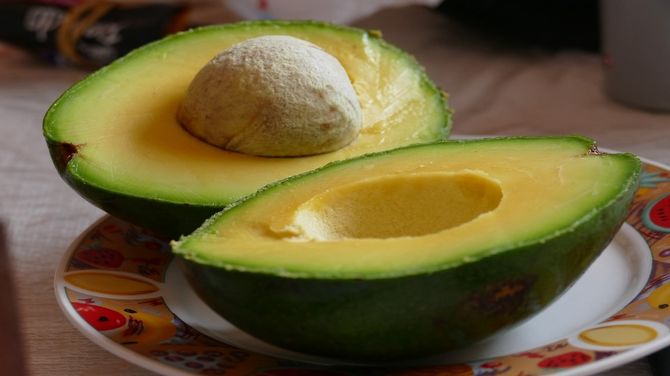
Apart from numerous benefits to the body, avocados are widely popular to improve mental health. Avocados are rich in healthy fats (monounsaturated and polyunsaturated fats) which nourish brain cells. These super-fruits are packed with folate and vitamin K, both of which reduce your risk of stroke.
According to recent studies, those who eat one avocado each day for 6 months see considerable cognitive gains, as indicated by enhancements in memory. Lutein, which is abundant in avocados, has been associated in studies with greater brain function.
Avocados also have like 20 minerals and vitamins A, E, D and K, which improve the overall human body. These green fruits keep our hormone levels in balance, which are directly linked with human mood and behavior.
Avocados are also known for their amazing benefits to the body, like preventing cancer, keeping your eyes healthy, reducing cholesterol, preventing arthritis and many more.
4. Nuts
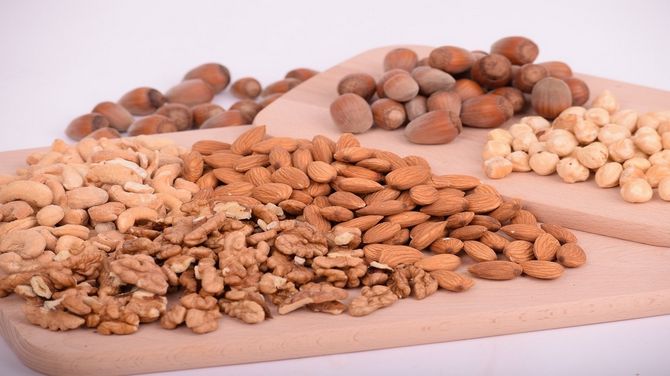
We have been hearing about the numerous benefits of nuts since our childhood, and yes, they are all true. Nuts have antioxidants in them which help the brain to function properly.
Nuts help our heart to function properly, and that promotes our brain function, too. Regular nut eating may reduce the risk of cognitive impairment in elderly individuals. Nuts have healthy fats, Vitamin E, minerals and antioxidants which are scientifically proven to promote brain health. Vitamin E protects cells from radical harm, which slows down the aging process.
A recent Harvard study has shown a significant relationship between nut intake and longevity. Researchers found that everyday nut consumers had a 20% reduced likelihood of dying than non-nut eaters in a study comprising more than 100k people.
Of all nuts, walnuts are the most beneficial for your brain, as they have high DHA, which improves brain health in infants.
5. Berries
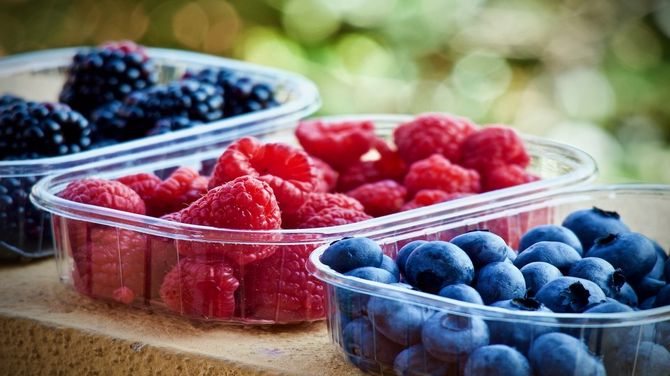
When it comes to foods that improve mental health, berries cannot be left out at any cost. Delicious, vibrant berries like strawberries, blueberries, and raspberries are excellent for the brain. A 2020 research found that those who consume more berries enjoy better mental health than those who don’t.
They are an abundant source of antioxidants that aid in cell repair and the elimination of symptoms associated with anxiety and sadness. Free radical damage causes inflammation, which is combated by antioxidants.
Strawberries and blueberries have polyphenolic, a substance that has been shown to enhance memory, focus, and cognitive skills. Wild blueberries stand out among other berries because they contain more manganese than others. Although manganese is a lesser-known mineral, it seems to be essential for mental well-being.
Strong scientific data shows that they could also aid in preventing memory loss related to aging.
6. Dark Chocolate

Name someone who doesn’t like dark chocolates, I bet you can’t. This tasty thing has more health benefits than we can ever imagine. Dark Chocolates have 80% more cocoa in them than other regular chocolates.
It contains flavonoids, which are antioxidants that increase blood flow to the brain and enhance mood and memory. Dark chocolates are known to reduce depression and brain function. Flavonoids may be able to delay the mental loss that comes with aging, according to researchers.
Young people who consume high-flavanol cocoa tend to have better cerebral blood flow, according to research. Thus, regular consumption of cocoa may contribute to improved language learning and cognitive function. Another study also shows that people who consumed dark chocolate were happier with their life than those who didn’t consume it.
So, the next time you crave dark chocolate, don’t be too hard on yourself.
7. Yogurt
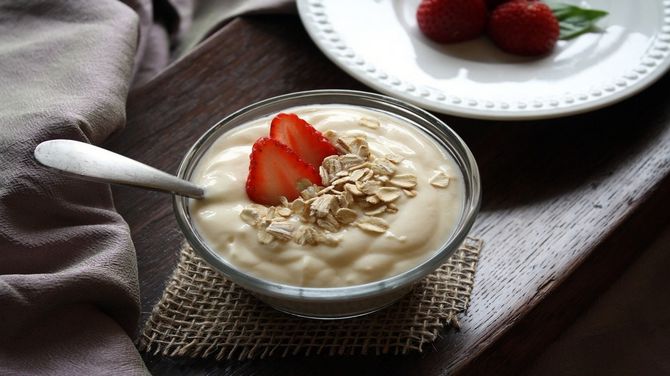
Having yogurt after a meal is almost everyone’s favorite. Yogurt is a rich source of probiotics. Probiotics, which are frequently linked to gut health, have been found to help people feel less anxious and stressed.
Yogurt is a rich source of potassium and magnesium, which assists our brain to get enough oxygen to operate correctly. Curds are scientifically proven to improve our mood and reduce anxiety levels.
According to research, yogurt includes Lactobacillus, a bacterium that enhances digestion and strengthens immunity. These bacteria are crucial in altering the body’s microbiome, which aids in the treatment of depression. Yogurt helps the brain convert stress chemicals into feel-good hormones.
Therefore, add a bowl of yogurt to your daily diet. Try to take yogurt in the morning as it gives the maximum benefit.
8. Eggs

Eggs are one of the most convenient food options to improve mental health. Eggs contain several nutrients directly associated with brain function, including Vitamin B12, B6, Choline, and Folate.
Our body needs choline, a crucial vitamin, to make acetylcholine, which is plentiful in eggs. Nowadays, most people don’t get enough choline from their diet, so eating eggs can help to fight the deficiency. The yolks of eggs also contain a high concentration of nutrients.
The B vitamins also have a number of roles in human brains. They could aid in preventing the elderly’s mental decline. Additionally, depression has been associated with deficiencies in the B vitamins folate and B12.
Apart from memory, eggs are a rich source of protein and improve our overall health, so include at least one in your daily diet.
9. Broccoli
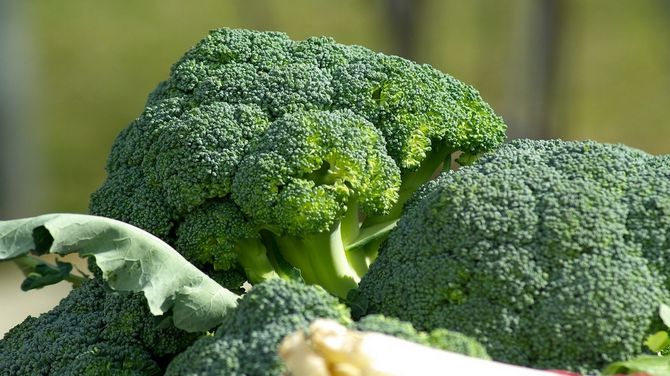
Broccoli is one of the most common veggies in our kitchen. This green vegetable is full of healthy nutrients and can improve our health to a great extent if regularly taken. Broccolis have anti-amnesic properties which help to keep our memory sharp.
Sulforaphane, a substance in broccoli, is known to help in cognitive recovery from brain injuries. Some research shows that the anti-inflammatory and antioxidant characteristics of sulforaphane may help the brain’s injured neural cells regenerate. Lutein, a pigment found in broccoli, is known to preserve crystallized intelligence by shielding the brain’s neurons.
Broccolis have enough carbs, protein and fiber to keep a human body functioning properly. Besides being brain food, it also has a good number of health benefits like preventing cancer, improving eyesight, reducing inflammation, controlling sugar and many more.
10. Beans
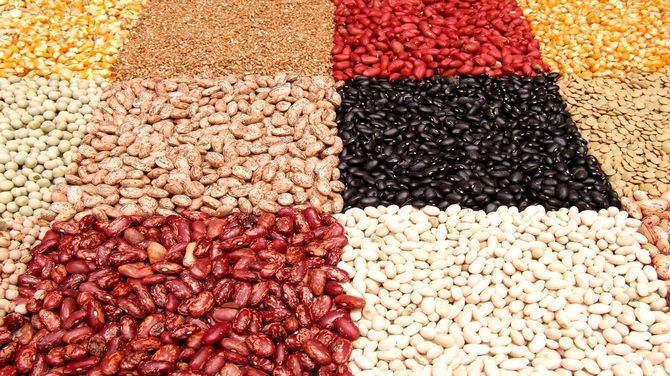
Beans are an excellent source of vitamins as well as protein and other beneficial ingredients. These vitamins support elevating neurotransmitter levels and mood regulation. They play a critical role in the nerve signaling pathway that facilitates communication between nerve cells.
Both tryptophan and magnesium, which are abundant in beans, have been associated with benefits in mood and mental health. Several essential elements, namely folate, are present in beans. Folate is important for maintaining overall health, producing healthy red blood cells, as well as protecting growing foetuses from neural tube defects.
Thiamine, which boosts the synthesis of acetylcholine, is abundant in beans. Beans are also known to improve heart health and prevent cancer.

